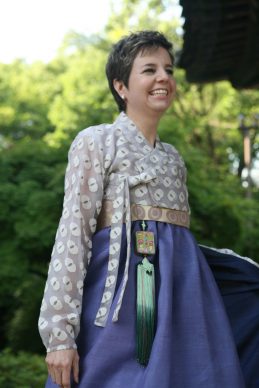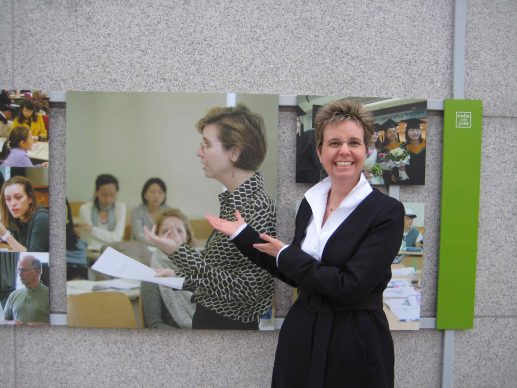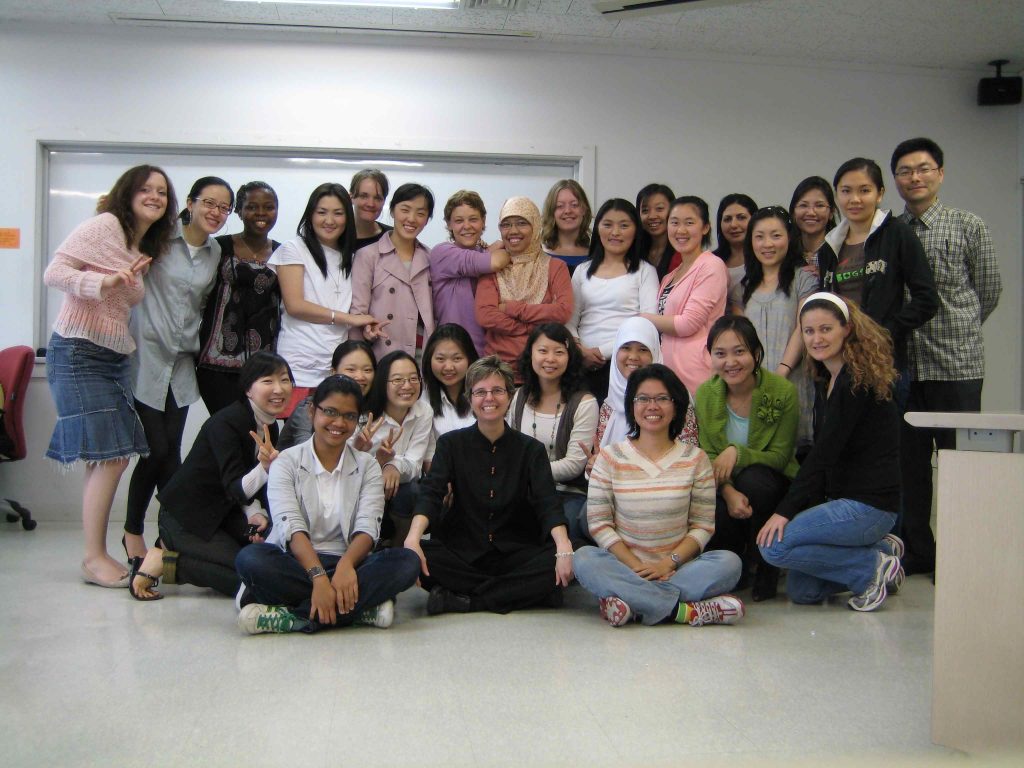At A Glance
Seoul, Korea, October 2010
Heather Willoughby discovered she had a destiny: To study ethnomusicology and return to teach it in the beloved country of her mission, Korea. Now a professor at Ewha Womans University in Seoul, the largest women’s university in the world, Heather teaches comparative culture classes, as well as classes on gender and human rights. She has a special appreciation for Pansori, a traditional Korean music, and feels a deep spiritual connection to this country she loves.
What is your history with Korea?
I first visited South Korea in 1986 as a missionary. But even before my mission I had connections to the country. My undergraduate roommate at BYU was a Korean American—her mother was from Korean royalty and her father was Texan. I greatly enjoyed the stories she told. I loved trying to figure her out and learning about the complexities she faced as a Korean American. I was interested in Korea because of her and then traveled to Korea on my mission.
Many missionaries love where they serve; I don’t think I’m special in that way. But I did something that a lot of missionaries don’t do—I constantly asked questions about Korea. I wanted to understand the cultural and sociological basis of the country so that I could better share the gospel. I felt that if I understood how people thought or what their religious or philosophical backgrounds were, I would have a foundation for communication. But it was more than that. Even then, I felt deep ties to Korea. I remember when my mission ended, my mother traveled to Korea to pick me up, and I remember that I cried on the plane trip home. I’m not a person who cries a great deal, especially when I was in my 20s, but I cried leaving Korea. I felt like I would never go back. I had made some very dear friends and I felt a profound connection to the country.

Heather in traditional hanbok.
After my mission, I visited Korea many times as a graduate student and researcher in ethnomusicology, which is the anthropological study of music. I love ethnomusicology because it combines the study of music of the world, travelling and the analysis of people. I graduated in 2002 with a Ph.D. from Columbia University and spent an additional year in New York City working as an adjunct professor at three universities. After that I had a one year post-doctoral fellowship at Wittenberg University in Springfield, Ohio. As I finished the year at Springfield, I applied for quite a few jobs but didn’t find anything. I saw a job posting at Ewha Womans University in Seoul for a ‘Culture Specialist.’ I wrote to Ewha with no idea if my ethnomusicology background would constitute the type of culture they were looking for. Luckily, they wanted me, so I came back to Korea again.
Originally, I didn’t think that I would stay very long because what Ewha wanted me to teach wasn’t directly related to my field of study. When I was hired I planned on staying for three years; I thought that would allow me time to complete some publications and branch out and research some of the ideas I was working on. However, I’ve already been at Ewha now for more than six years! I’ve found that teaching outside of my field has expanded my knowledge and breadth and interests, and at this point, I have no intention to leave.
What do you love about teaching at Ewha Womans University?
Ewha Womans University is the largest women’s university in the world. It has about 26,000 students—including the medical school, the law school, the undergraduate and the graduate programs. Ewha was established in 1886 by a woman named Mary Fletcher Scranton. She was a remarkable woman. I love this woman dearly. I feel like I know her in some ways and am looking forward to meeting her in the hereafter and thanking her. Mary came to Korea in 1885 with her son and daughter-in-law as Christian missionaries for the Episcopal Methodist Church. Mary noticed that there were no schools for women—literally. Women were taught at home but there was no formal education system for them. Mary approached Korea’s king and proposed starting a school. She was granted permission but it was not easy going.
The school started with a single young woman who was an orphan; many of the young students who subsequently attended were also orphans. At the time, Koreans were wary of foreigners and felt their daughters might be kidnapped, so they wouldn’t send their daughters to the school. Because of this belief, orphans had a greater chance of being educated. Among the early orphan students was a woman who later attended Columbia University and became the first Korean female doctor. Ewha started out as an elementary school/junior high/high school and eventually expanded into a college and then a university. Fairly soon after the school was established, Mary went back to full-time missionary work. She continued for a time to teach at the school, and spent the remaining twenty-four years of her life in Korea. A total of six foreigners served as presidents of Ewha, one of whom was the first Caucasian born in Korea.

Ewha has a very rich heritage of remarkable women who did astounding things. I feel that in some minute way I’m a part of that heritage. A group of students and I were writing a book about the history of Ewha. As we were writing about the women who dedicated their lives to the service of God and Korean women, I felt a very deep spiritual connection to them. I felt like I was supposed to be here as part of their heritage and that I was supposed to learn about them. That’s one of the reasons that I love them, love the university and love being here.
Another thing I love about Ewha is the students in my department. Many of them have grown up abroad, especially the undergraduate students. Their parents were either missionaries, graduate students, or worked as ex-patriots in various countries. I taught a student who lived for 16 years in Turkey and is now attending Columbia University as a graduate student in the Islamic Studies program. I work with students from more than thirty countries—from the Middle East, Eastern Europe, and all throughout Asia and Africa. They have very diverse backgrounds and I love learning from them.
In a class just this week, we were discussing Buddhism. I started the class by asking, “How many of you or your parents or grandparents are Buddhist? How many of you are affected in your immediate family by an active, participating Buddhist?” I encouraged them to talk about their experiences and one of the girls said, “I’m not religious but my grandmother is Buddhist so she puts our names in the temple and prays for us and that really means a lot to me.” Hearing such experiences is a beautiful thing. I feel a very deep spiritual connection to the students.
I also love that I’ve been able to teach comparative culture classes, ask questions of the students and learn about their life. I get to teach classes about comparative religion and learn about the religions of the world. I’ve also taught courses on gender. Last semester, I taught a class called Women of East Asia. We studied the diversity of women’s lives, including their work, marriage and courtship, reproductive rights, prostitution and the so-called “comfort women,” who were sexual slaves during the Second World War; we covered a whole range of women’s lives. Probably most significant is that I’ve been able to teach classes about human rights, specifically women and children’s rights. I’ve even contemplated going back to school and getting a second degree in humanitarian law. I guess the beauty of my life is in how many things I’ve gotten to do. Even though I love ethnomusicology and wish I could teach more music classes, my life has been incredibly enriched by being at this university. It’s great for my spirit.
As part of your ethnomusicology background, you study and perform a form a traditional Korean opera called Pansori. How were you introduced to Pansori?
In 1986, I was in my third area as a missionary. It was a time in Korea when there were a lot of anti-government demonstrations and with that came some anti-American demonstrations as well. Beginning in the late 1970s, Koreans used folk music as a way to rally the people before political demonstrations. Knowing of my interest in music and Korean culture, an investigator invited my companion and me to a Pansori concert. I didn’t know what Pansori (a solo narrative genre) was at the time, but found that the concert was part of a pre-rally demonstration designed to get the students fired up. I was sitting in the back of the auditorium with my companion. There was a woman on the stage…she was quite small and it was just her and a drummer. She began to sing and tell a story. She had more charisma than anyone I had ever seen in my life. I’ve been to a lot of concerts: pop, rock, everything, but I had never seen something like this—the way that this single, diminutive woman captured the audience’s attention.
I was so drawn to her that I got out of my seat and walked along the edge of the wall and down toward the front of the stage, so that I could stand very close to her and watch. I was astounded at what I heard and saw. I met her after the show and in my halting Korean told her how much I loved and was amazed by her performance. I later learned that I was talking with Kim So Hee, one of the great masters of Pansori and at that time, probably the greatest Pansori singer ever.
Do you feel a spiritual connection to Pansori?
Absolutely. I’ve listened to hundreds of hours of Pansori. I love it. It’s fantastic. As a graduate student, I traveled to the southern portion of Korea to attend a concert in the town where Kim So Hee was born. Something felt different in that place and at that time. The performer that day was named Ahn Sook Sun, who was a disciple of Kim So Hee and a phenomenal singer herself. In all the hours that I had listened to Pansori and really enjoyed it, for the first time the story became real to me. She was singing the story of Chunhyang, a young woman facing incredible hardship. The sorrow that Chunhyang endured was real. The joy that Chunhyang experienced with her lover was real. The profundity of the story was real to me—not as an outsider, not as a researcher, but as someone alive and experiencing those things. There’s something specific about Pansori—the use of the voice and the immensity of emotion being expressed—that is phenomenal to me. It’s phenomenal that one person standing on a stage alone can express the entire gamut of human experience and emotion in a story that really isn’t their own and yet at the same time, somehow is. It is ineffable; I don’t know why or how I feel this way but it’s real and it’s spiritually profound.

Heather in Kalapatthar, Nepal (elevation 18,500ft/5600m) with Mt. Everest in the background
It’s remarkable that you are so spiritually enriched by your career. Do you think that you could do anything or does your career have to be spiritually meaningful to you?
Definitely yes….at least for the type of person who I am. Since I was 12 years old, I’ve had a very good sense of who I am. It’s always been a spiritual connection. I recognize this spiritual path and that the only way that I’m going to be satisfied or happy is to connect myself to things that my spirit is drawn to. I can do any job, but if I have the chance to do what makes my spirit complete and full and happy, then why not? I’ve been blessed to do that.
There is a word in Korean that I love which is ‘kureoda’ and it means, “It is the way it is.” After I graduated with my undergraduate degree, I worked as an elementary school music teacher for three years in Southern Idaho. I was looking into graduate schools, and I wanted to go into music therapy so I looked at schools that had music-related majors. As I was researching, I ran across a pamphlet with the word ‘ethnomusicology.’ I thought, “I don’t know what it is, but this is my destiny.” And it was my destiny. It has worked out well. Coming back to Korea has not always been easy. It’s hard that I’m away from family and friends but I have family and friends here as well. There are still things that are difficult, but there is something comforting about being here that is a part of that destiny.
Is there anything more you would like to share in regards to your experience in Korea?
I have a very profound love for Korea. It’s a fascinating thing. I wrote a poem about it called Yunhoi which means “Transmigration of the Soul”. It’s about the re-discovering of life.
??
(Yunhoi: Transmigration of the Soul)
The golden grain bows its heavy head
As it has done for a thousand years before
My own head bows
In deference and awe
To what I now understand
I am coming home
How long has it been
Since I trudged through these hills
A puk upon my back
A song falls from my lips
With words I do not know, but meaning I comprehend
I am coming home
My hanbok wraps to the left
A symbol of my profession
My fingertips and voice are calloused
As well my heart at times must be
When I am coming home
Black soil escapes my fisted hand
I feel the depths of its essence
Do my bones lie beneath
The surface of what the eye can see?
I am home.
The final line refers to the Pansori concert I attended as a graduate student. Being in that space literally felt like home. That is the only way that I can explain it. This is my home. I don’t know why it is. In the LDS church we don’t believe in reincarnation in the literal sense, but there is something that is beyond this mortality that ties me to this country, these people, and this music. It is not something that is just of this mortal life. I have no idea how that happens or why, but it is why I am here.
At A Glance
Heather Willoughby
 Location: Seoul, Korea
Location: Seoul, Korea
Age: 45
Marital status: No history whatsoever in this regard
Occupation: Professor
Convert? 1972
Schools Attended: Brigham Young University (Bachelor’s in Music), Columbia University (MA,
PhD)
Languages Spoken at Home: Kittyspeak (usually including the word “No!”)
Favorite Hymn: “Come Thou Fount of Every Blessing,” “Jesus Savior Pilot Me”
Interview by Krisanne Hastings. Photos by Hilary Finchum-Sung and Kim Yeong-Lan.
At A Glance

